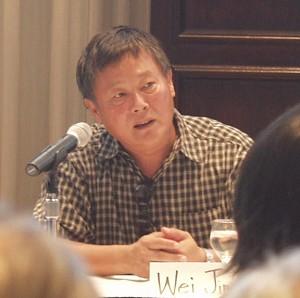One of China’s most famous democracy advocates says that America has not paid enough attention to the threat of nuclear war with China. Wei Jingsheng, who spent 18 years in confinement in China, spoke at a forum on Chinese leader Hu Jintao at the National Press Club, sketching a disturbing picture of a powerful nation on the march to war.
The forum consisted of China expert panelists giving their various perspectives on the underlying meaning behind the visit of Chinese leader Hu Jintao, who has been in power for the last two years.
Wei stated that China needs the distraction of a war with Taiwan to turn attention away from the Chinese people’s frustration with rampant corruption and failed policies at home.
Wei also stated that a number of factors allow them to consider traditional warfare against Taiwan and even nuclear warfare against the U.S.
First, Russia, who China has often seen as an enemy, has offered a tacit agreement to China’s military plan, said Wei.
He pointed out that “China has signed a treaty with Russia that basically says if China invades Taiwan, Russia will not support the U.S.”, that meant that they would defend Taiwan if the island came under attack.
China also teamed up with Russia recently for joint military exercises on the Shandong Peninsula, an area fairly close to Taiwan, indicating both China’s intentions and Russia’s acceptance of those intentions.
Wei said that China had also been considering nuclear war against the U.S. as a way to defeat America in the war. The Chinese Communist Party (CCP) is considering nuclear war, Wei said, because it is not afraid to sacrifice China’s people.
He took as an evidence Chinese general Zhu Chenghu’s recent public statement declaring that China would launch nuclear weapons against the U.S. if it attacked China and that “we … will prepare ourselves for the destruction of all the cities east of Xian,” which would include Beijing, Shanghai, and Canton.
Although the general’s view was not publicly corroborated by other officials, Wei said, China’s government-run media enthusiastically circulated the statements.
Wei also warned Americans not to underestimate the irrational behavior of the CCP leadership and that America’s best response to prevent a coming war is to begin taking it seriously.
The Communist Chinese are very dissembling, Wei said. They try to appear to the world as less threatening, while at the same time they plan their next move.
Other panelists added that part of the reason Communist Party officials fear for the Party’s future is the Epoch Times’ “Nine Commentaries on the Communist Party”, an editorial series on the CCP published in November 2004 that has inspired four million Chinese people to cancel their Communist Party membership.
“Whether the campaign of ’maintaining the advanced nature of the party,' or anti-Japanese parades, or anti-secession law [i.e., invade Taiwan if it declares independence], or nuclear threats to the U.S., all of these are for the purpose of diverting public attention on the mass resignations,” says Frank Gong, writer for the Chinascope magazine.
According to an August 15 report on the “Liberation Army Daily,” the Central Military Committee of the Chinese Communist Party released a regulation to bar “private collection of information with severe political issues,” Gong stated. “This indicated that the ”Nine Commentaries“ had widely spread in the military and caused the Central Military Committee of the Chinese Communist Party to be on high alert.”
The other panelists too tried to dispel the image of China as a nation taking its place in the world as a contributor to peace and prosperity.
Dr. John Li, Senior Research Fellow, Association for Asian Research, described an “equilibrium” status the U.S. currently enjoys with China: the U.S. gains access to cheap labor, even though the factories are polluting the country, while China’s totalitarian state acquires badly needed investment dollars.
“It might be good for the U.S. that this equilibrium can be kept forever, with the Chinese regime getting the assurance of ”no regime change“ and the U.S. businesses getting the money squeezed from cheap Chinese labor.” However, as much as the U.S. would like it to continue, Li said, the U.S. cannot avoid the fact that the Chinese have “never wavered in their belief that ‘America is their No. 1 enemy’.”
Dr. Li thinks the U.S. should distinguish its true friends from its foes. The only way to do that is by looking at countries’ human rights records. Treating China as its adversary, that is, a regime contrary to U.S. values, will lead to the best result in the long term, he said.
All the panelists agreed that America is sleeping, dreaming images of a pleasant, peaceful China. America wants to believe that the CCP has changed and has put an end to its brutal past. But Frank Gong asked rhetorically, “How do you ‘get over’ causing the deaths, unnecessarily, of 80 million people?” He argued that the CCP would never want its crimes exposed.
“So as for the Chinese Communist Party, let’s not consider how much it has improved. We need to consider whether it intends to improve. Once it opens up political freedom and freedom of speech, its past crimes will be exposed. People will have access to information concerning democracy and the rule of law. Then what the CCP faces is not only immediate collapse, but also accountability of all its crimes.”




